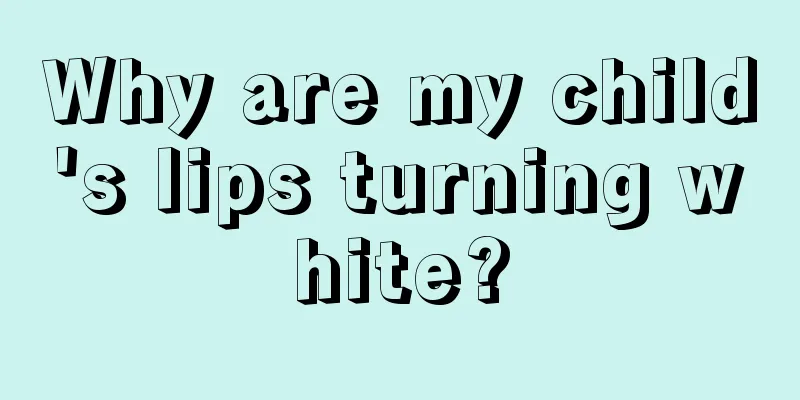Symptoms of anemia in one-year-old babies

|
Anemia in babies is a rather troublesome matter, and because the baby is too small, it is not very easy to detect even if he has anemia. If your baby is anemic, his immunity will be lower and he will be more likely to develop other complications. Children cannot speak until they are one year old, so even if they are not feeling well they cannot express it. Parents should pay attention to their children’s body language to ensure their health. So, what are the symptoms of anemia in a one-year-old baby? 1. Symptoms of anemia in one-year-old babies A one-year-old baby with anemia will first have a pale complexion, dull lips, and pale eyelids, which means the child has poor resistance. If he suffers from repeated respiratory tract infections, he will also have symptoms of poor appetite. 2. What to do if your one-year-old baby is anemic
1. Seek medical advice. Generally, unless the doctor tells you about your baby's condition, it is difficult for an individual to detect that your baby has anemia. Because children around one year old cannot express themselves, even if they are uncomfortable they can only express it through crying. Doctors will give different guidance and suggestions based on different degrees of anemia. It's better than having no direction at all. 2. Causes of anemia in babies. Many babies' illnesses are caused by acquired eating habits and unbalanced nutrition. Especially for babies who have been exclusively breastfed, they are more likely to suffer from anemia if the complementary food they eat is too little or unbalanced. If your baby's anemia is caused by a medical condition, you should seek guidance from your doctor. 3. Improve food nutrition. Feed your baby more foods high in iron, such as iron-containing milk powder, rice noodles, noodles, red meat, eggs, etc. If it is difficult to add complementary foods to the baby and the baby is breastfed, the mother must supplement the baby with high-iron foods through her own milk. In comparison, the iron in breast milk is easier for the baby to absorb. 4. Develop healthy eating habits. Some babies love snacks when they are over one year old, and my niece is one of them. You can spit out the skin of any candy, peanuts, or melon seeds and eat them. He eats too much and refuses to eat at mealtime, which makes his family very worried. He has to be coaxed and force-fed to eat. It is best to introduce snacks to one-year-old babies later, and they can be replaced with fruits. 5. Try to let your baby learn to eat milk powder. Even rich complementary foods cannot match the nutritional balance of infant formula. Your baby should be fed with milk powder that is high in iron. After one cycle, the baby's anemia will be significantly improved. Also, don't be vague about complementary foods. After all, your baby likes new and novel foods, and eventually she/he has to learn to eat by herself. |
<<: Redness around the baby's eyes
>>: What causes baby's eye swelling?
Recommend
What causes nosebleeds in children?
Children's noses always bleed, which makes ma...
How to effectively treat children's athlete's foot
Not only adults can suffer from athlete's foo...
Three-year-old poops and there is blood when wiping his butt
For children, it is actually very easy to have bl...
Causes and treatment of bloody stools in children
Babies are the apple of every parent’s eye and th...
Can children eat Cordyceps flowers?
There are still many differences between children...
What causes baby's hands to peel?
Some babies have problems with their bodies, so t...
What to do if your 2-year-old baby has tonsil suppuration
A 2-year-old baby has tonsillitis? This sounds li...
Is it good for children to take a bath when they catch a cold in autumn?
Is it good for children to take a bath if they ha...
What should I do if my baby has a fever, convulsions, or seizures?
We all know that if a child has a high fever, it ...
The ninth month baby development indicators
We all know that the developmental indicators of ...
What to do about anemia in premature infants
Some premature babies have problems with anemia a...
How to make children fall asleep quickly?
Many children have the problem of reversing day a...
Mild anemia in children
Children usually have the problem of being picky ...
What are the common complications of nephrotic syndrome in children?
Don't think that only adults can get kidney d...
Four and a half year old baby wets the bed
Bedwetting in children is a distressing issue for...









